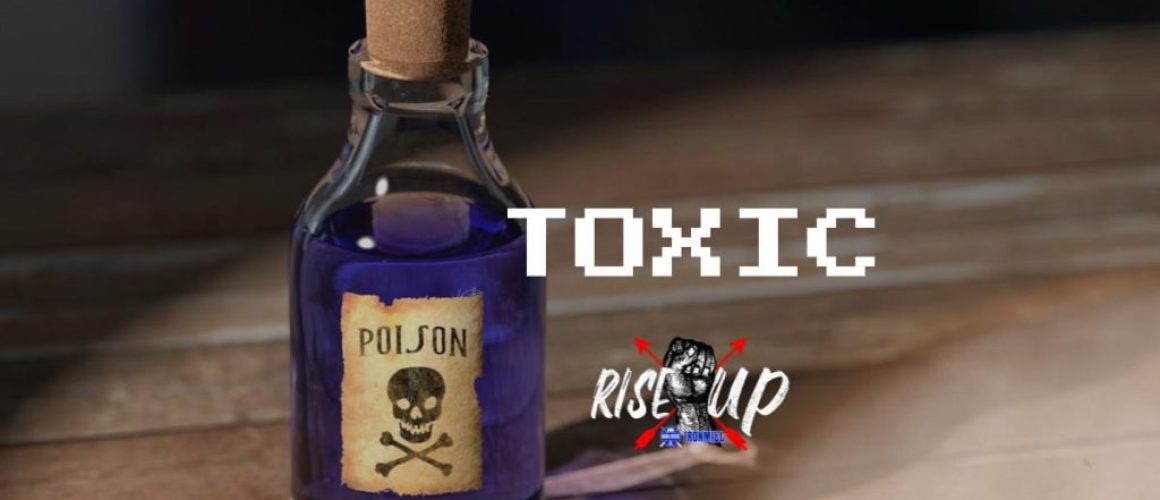Toxic – by Josh Hatcher – Rise X Up
Poison is in everything, and no thing is without poison. The dosage makes it either a poison or a remedy.
Paracelsus
The word “toxic” has taken on many new meanings these days.
It’s funny what happens when we play games of word association. Now the word toxic is almost always associated with masculinity, and masculinity is almost always associated with toxic. This is shameful. I know that people aren’t saying all masculinity is toxic, but no one seems to be able to wrap their heads around the unintended consequences of a media feeding frenzy around a newfangled cultural trope.
Toxic people have always existed.
All people are toxic.
What did he say? Yes. We all have the capability of being a poison or a remedy in the lives of other people. We all have the capability in our own minds of being a poison or a remedy to ourselves.
When I was little, my parents would correct things that I said. It irritated me, because I was a cocky little intelligent kid who knew exactly what words I was using. How dare they correct me!
Dad: Son, where is your homework?
Me: I forgot it.
Dad: Why did you forget it? You were supposed to bring it home.
Me: Gosh, Dad, I just forgot, I’m forgetful.
Dad: No. You don’t “just forget.” Stop making excuses.
Me: I just can’t—Mom: Don’t say that.
Me: say what?
Mom: Whatever it was you were about to say you can’t do.
Me: but I can’t!
Mom: Can’t never could. Remember that book I used to read you?
Me: Stop, Mom.
Mom: With the little train engine? “I think I can! I think I can!”
Me: C’mon, Mom!
Mom: “I think I can! I think I can!”
Me: …
I didn’t get it. I was a kid. Kids never get anything. They just think they do.
The entire universe in my brain was bottlenecked though by a few very toxic thoughts.
What you believe is very powerful. If you have toxic emotions of fear, guilt and depression, it is because you have wrong thinking, and you have wrong thinking because of wrong believing.
Joseph Prince
I believed that if I forgot something, it somehow absolved me of responsibility. How could I be held accountable for something that I didn’t think about?
I believed the “I CAN’T” that always swirled in my head. Why push myself? Why strive and struggle when I just CAN’T?
These are probably the simplest examples – but there were multitudes of other poisonous thoughts like this that influenced my decision making.
“SSSSSSSST”
I can hear it. I can still hear it. I remember the sound more than the pain.
I was 5 years old. A wide-eyed kindergartner that could already read.
They were teenagers. Brothers. Hellions.
And they had a book of matches.
And a warped sense of humor. They had already stolen my hat, and tossed it on top of the soda machine at the bus stop. I got in trouble for losing it, but I didn’t tell mom and dad that they took it. It was my problem to deal with. I didn’t need help.
I remember their pubescent cracking laughter, with a touch of bass, now a lilt of falsetto. I don’t remember any words. I just remember the laughter.
Now, a book of matches. One at a time. Lit, then put out on my neck.
“SSSSSSSST”
Laughter.
Scratch. Fizzle. “SSSSSST”
Laughter.
I didn’t know what to do. So I didn’t do anything.
It was my problem to deal with. I didn’t need help.
Eventually, one of the neighbor girls told my parents, who immediately took care of the situation. They had the school move a bus stop closer to the house, and made sure those boys took a different bus.
I remember reading about a woman who made lime jello for her husband everyday for lunch. She would add a few drops of antifreeze to it. Antifreeze tastes sweet, and could easily be camouflaged by lime jello. A few drops at a time wouldn’t kill him right away, but the antifreeze would get into his bloodstream and then crystalize in his brain. Those crystals would continue to grow as more antifreeze as introduced. Eventually, slowly, he would die.
So many of my experiences, those matches, bullying, and a myriad of other trauma crystallized in my brain. Those toxic thoughts would crystalize and grow, and left unchecked, they’ll kill me.
We often find ourselves wallowing in a circumstance. We don’t know how we got in to that place.
Poverty / Overweight / Divorce / Addiction / Infidelity / Debt / Out of work / Stressed / Depressed / Lonely
And it’s easy to look at those circumstances as external factors pressing in. (There are certainly times when external forces beyond our control can affect many of those situations.) In most cases though, we are where we are because of the choices that we make. Our behavior creates our circumstance.
Behavior comes from Feelings. We feel a certain way, want to feel a certain way, and we carry out an action to either make the feeling go away, or for a new feeling to come.
Feelings come from Thoughts. We think and we believe certain things, and those thoughts are formed and shaped by our memories, and the way we think affects our mood and our attitude.
If I do not like my circumstance, I must change my actions. If I do not like my actions, I must change my feelings. If I do not like my feelings, I must change my thoughts.
But how do I change my thoughts?
Our thoughts are plastic, and they can be shaped and formed. Even bad memories of trauma can be reframed to yield better results.
For me, it started by telling myself the truth. Looking myself in the eye in the rearview mirror while driving, screaming at the fool looking back at me.
YOU CAN DO THIS.
YOU AREN’T WORTHLESS. YOU ARE VALUABLE.
IT’S OKAY TO ASK FOR HELP.
YOU ARE SMART. SMART IS GOOD.
And a long list of truth that I needed to hear.
If we don’t take ownership of our own brains, we will surely find that they are owned.
You don’t have to keep distilling the poison. You can clean it out.




